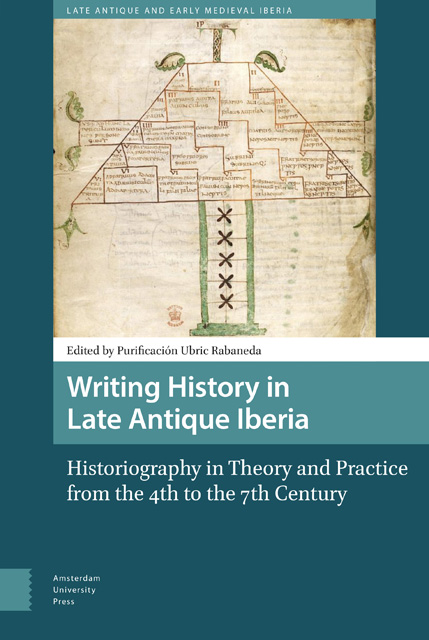 Writing History in Late Antique Iberia
Writing History in Late Antique Iberia Published online by Cambridge University Press: 18 April 2023
Abstract
Between the fifth and seventh centuries, the historiographical genre of Christian inspiration and Roman orientation gradually gave way to the national histories of the Roman-Germanic peoples settled in the pars occidentis of the empire. Because of their structure, national histories have many things in common with the ancient historiographical works but differ in their ideological foundation and interpretation of the episodes narrated. Christian authors combine ecclesiastical and political events, interpreting them according to a providential conception of history. This phenomenon can also be observed in Spanish historiography. The writings of Hydatius of Lemica, John of Biclaro, Isidore of Seville, and Julian of Toledo provide us with valuable insights into the various reactions to the invasions of Germanic peoples in the Iberian Peninsula and other events otherwise unknown.
Keywords: Christian Historiography, National Histories, Romans, Visigoths
The proliferation of known ‘Ecclesiastical Histories’ should be located in the Greek-Byzantine world, where a theological-political reflection on the empire, conceived as universal and providential, made inroads. Eusebius of Caesarea is unanimously considered the founder of this Christian historiographic genre, which spread in later centuries in both the East and the West. Eusebius’s Chronici canones , in fact, radically transformed the formulation of Christian Chronography and he created a new literary genre with the Historia Ecclesiastica . This author conceived a new type of history, unconventional in outlook and methodological in approach, grounded in a new religion. He established and transmitted the notion that God’s plan of salvation realises itself through the centuries.
Eusebius’s notion is characterised as a providential vision of history, devoid of free will. This is one of the key differences that would soon distinguish pagan from Christian historiography. The first was based on free judgement, which was a source of pride for ancient historians. Conversely, the other was grounded in scriptural authority. Concerning pagan historiography, Eusebius’s originality lies in the object of his history, namely, the church/ churches, which he characterises as the people or the Christian nation (ethnos ). Indeed, the very title of his work, Historia Ecclesiastica , does not refer to the church as a theological and institutional entity. In this work, the word ‘church’ seldom appears in the singular, indicating the theological notion of a universal church intended as an assembly united by faith, feeling, and institutions.
To save this book to your Kindle, first ensure [email protected] is added to your Approved Personal Document E-mail List under your Personal Document Settings on the Manage Your Content and Devices page of your Amazon account. Then enter the ‘name’ part of your Kindle email address below. Find out more about saving to your Kindle.
Note you can select to save to either the @free.kindle.com or @kindle.com variations. ‘@free.kindle.com’ emails are free but can only be saved to your device when it is connected to wi-fi. ‘@kindle.com’ emails can be delivered even when you are not connected to wi-fi, but note that service fees apply.
Find out more about the Kindle Personal Document Service.
To save content items to your account, please confirm that you agree to abide by our usage policies. If this is the first time you use this feature, you will be asked to authorise Cambridge Core to connect with your account. Find out more about saving content to Dropbox.
To save content items to your account, please confirm that you agree to abide by our usage policies. If this is the first time you use this feature, you will be asked to authorise Cambridge Core to connect with your account. Find out more about saving content to Google Drive.